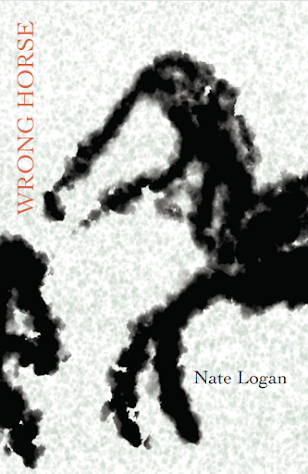Nate Logan, Wrong Horse
At the end of a toughweek, I treat myself to some curbside steak, broccoli, and brick of bread. I waitfor the bill and see right into the restaurant. A hostess rolls her eyes so farin her head, I feel a little sick. Some child uses a red crayon with disturbingflourish. A slice of cheesecake is put in front of an elderly couple. I’m theonly person in the designated to-go parking area. The wind nudges the car witha sock foot. (“Parking Lot”)
 Thesecond full-length collection by Wisconsin prose poet and editor Nate Logan, following
Inside the Golden Days of Missing You
(Magic Helicopter Press, 2019), aswell as a small array of chapbooks (including one by above/ground press), is
Wrong Horse
(Chicago IL: Moira Books, 2024). I’ve been following for a while thecurious trajectory of the American prose poem, one that appears to have been furtheredquite prominently by the late Russell Edson [see my review of his posthumous selected poems here], a form that leans rather hard into what others mightsuggest as a very short or postcard story. There seem a handful of poetsfollowing that particular influence: Sarah Manguso’s early work, for example,or that of Evan Williams, Elisa Gabbert or Benjamin Niespodziany. Logan’s narrativeprose poems, through Wrong Horse, might share certain elements of all ofthe above, but not necessarily the surrealist and cinematic elements ofNiespodziany, or the theatrical gestures and impulse of Gabbert, yet the same elementsof scene-composition remain. Logan’s approach, instead, offers a curious andeven kinetic push against endings, refusing to provide those easy or expectedlandings. Logan’s poems offer a calm, almost unsettling sense of quiet, writingsomething slightly off in the narrative, unsettling the very foundation of the narrative;not in a surrealistic way, but something else, other. There is such a fantasticsubtlety to the way Logan approaches each prose-block, each poem, a quietudethat might allow inattentive readers to not fully appreciate just what it ishis work provides. His poems put all those narrative parts into play, intomotion, but stops just short of the implications, allowing the reader to fillin the rest. “To spend the equinox in a hammock,” he writes, to close the poem “TheHome Stretch,” “wasting my life. Or not breaking the backs of mothers walking aWeimaraner. And there’s the mannequin again with an egg in its mouth.” As Loganwrote as part of a statement on prose poems last fall, for periodicities: ajournal of poetry and poetics:
Thesecond full-length collection by Wisconsin prose poet and editor Nate Logan, following
Inside the Golden Days of Missing You
(Magic Helicopter Press, 2019), aswell as a small array of chapbooks (including one by above/ground press), is
Wrong Horse
(Chicago IL: Moira Books, 2024). I’ve been following for a while thecurious trajectory of the American prose poem, one that appears to have been furtheredquite prominently by the late Russell Edson [see my review of his posthumous selected poems here], a form that leans rather hard into what others mightsuggest as a very short or postcard story. There seem a handful of poetsfollowing that particular influence: Sarah Manguso’s early work, for example,or that of Evan Williams, Elisa Gabbert or Benjamin Niespodziany. Logan’s narrativeprose poems, through Wrong Horse, might share certain elements of all ofthe above, but not necessarily the surrealist and cinematic elements ofNiespodziany, or the theatrical gestures and impulse of Gabbert, yet the same elementsof scene-composition remain. Logan’s approach, instead, offers a curious andeven kinetic push against endings, refusing to provide those easy or expectedlandings. Logan’s poems offer a calm, almost unsettling sense of quiet, writingsomething slightly off in the narrative, unsettling the very foundation of the narrative;not in a surrealistic way, but something else, other. There is such a fantasticsubtlety to the way Logan approaches each prose-block, each poem, a quietudethat might allow inattentive readers to not fully appreciate just what it ishis work provides. His poems put all those narrative parts into play, intomotion, but stops just short of the implications, allowing the reader to fillin the rest. “To spend the equinox in a hammock,” he writes, to close the poem “TheHome Stretch,” “wasting my life. Or not breaking the backs of mothers walking aWeimaraner. And there’s the mannequin again with an egg in its mouth.” As Loganwrote as part of a statement on prose poems last fall, for periodicities: ajournal of poetry and poetics:There are frequent stopswhen traveling by prose poem; for me, this is one of its unique charms, maybethee charm that keeps me coming back. Unlike another poem that can move betweena line that spans across the page and a zig-zag all within the same piece, Iknow, and the reader knows, the prose poem will start and stop, then start andstop again. Being invited to sit with sentences, poetic sentences in noparticular hurry, is a pleasure. Furthermore, the tendency for the prose poemto wind around surrealism (neosurrealism?) is a nudge to the reader to staywith sentences longer—the associative leaps lend themselves to contemplation(this is a whole other essay). The “radicalness” of the prose poem still liesin its form, but the beat has changed. And when the poem does end, either atone paragraph or a few pages, if it goes especially well, the accumulation ofsentences stirs a reader, which is what all good poetry should do (even still,Charlie, I didn’t mean to make your mom cry).



